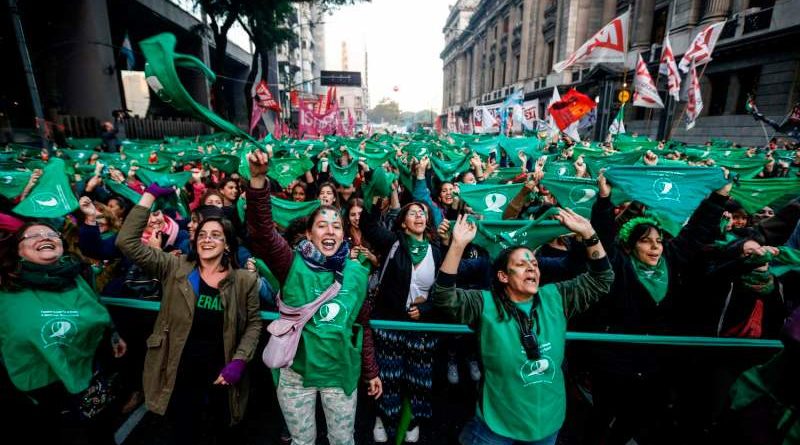Young Voters Care About Abortion Policy. Argentine Politicians Are Ignoring Them.
The youth vote is becoming increasingly important in Argentina, but the leading presidential candidates are deliberately avoiding the issue that matters most to them.
SALTA, Argentina —When Milagros Peñalba and Camila Monzón, both 17, consider supporting a political candidate in Argentina’s next presidential election, the key issue is not how to tackle Argentina’s massive debt burden or how to curb skyrocketing inflation. What they care about most is whether the candidates are in favor of legalizing abortion.
Since the nationwide debate on abortion rights last year culminated in disappointment for those in favor of legalization, the two youth activists have campaigned for reproductive rights, better sex education, and access to contraceptives in their hometown of Salta, in Argentina’s deeply conservative north. They also organize events encouraging their peers to get to know their political representatives.
“The movement really ignited an interest among youth in politics,” said Peñalba, who spoke in the Senate in favor of legalization last year. “We want to see that our representatives stand for what we believe in.”
“Before, here in Salta, we didn’t have a youth movement,” Monzón added as she adjusted her green handkerchief, a symbol of the abortion rights movement. “Now, we can at least be aware of which deputies are pro-life and which ones are demanding the legalization of abortion.”
Yet the issue that matters most to them—and to many other Argentine first-time voters—is one that has been almost entirely absent from the agenda of major presidential candidates ahead of the country’s general election in October. Argentina made headlines last year when it narrowly failed to approve legislation that would have made elective abortion legal up to 14 weeks into a pregnancy. Currently, the practice is only allowed in the cases of rape or risk to the mother’s life, and women who seek illegal abortions can face up to four years in prison.
Pro-abortion rights campaigners introduced a second legalization bill in May in an attempt to keep the subject in the spotlight. But instead of reproductive rights, the country’s deteriorating economy has taken center stage.“Like in elections in most places, economic issues are dominating in Argentina,” said Benjamin Gedan, the deputy director of the Latin America program at the Wilson Center and the director of the think tank’s Argentina Project. “It’s hard to be heard over the economic argument.”
And the economy appears by far the most important priority to voters, who seemedto be punishing President Mauricio Macri for austerity and failure to boost growth. Sunday’s primary elections—a key bellwether for the October vote—saw opposition candidate Alberto Fernández capture a larger-than-expected 47 percent of the vote. Macri, whose austere economic policies have fueled anger in many voters as jobs numbers have failed to rise and inflation has spiraled, trailed at 32 percent.
Many analysts had predicted a closer contest between Macri and the moderate candidate Fernández, whose running mate is former President Cristina Fernández de Kirchner, a populist who, despite numerous allegations of corruption, remains a political force in Argentina. The primary results also indicate that voters are unlikely to give Macri another term to fulfill his promises of economic recovery.
In a polarizing and uncertain race, both campaigns have been wary of delving into divisive issues such as abortion for fear of losing voters, said Mabel Bianco, the president and founder of the Foundation for Studies and Research on Women, a nonprofit that campaigns on women’s health issues. “They don’t want to incorporate something that could divide voters,” she said. “So they prefer people to be voting for them based on economic issues.”
Ver en Foreing Policy

